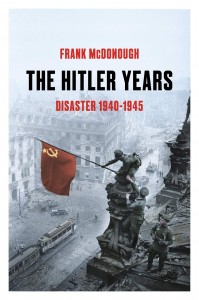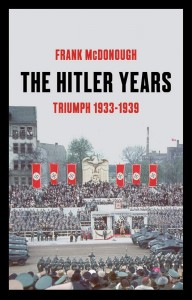The Hitler Years
Triumph 1933-1939
Disaster 1940-1945
The Hitler Years is a major two volume narrative history of the dramatic and horrific period when Hitler ruled Germany from 1933 to 1945. Volume 1: Triumph covers 1933 to 1939 and Volume 2: Disaster covers 1940 to 1945. Each chapter looks at each year in detail. Each book is richly illustrated with over 120 photographs. The volumes are available in hardback, paperback, Kindle and audio book (read by Paul McGann).
“This is a book of big themes, big ideas and world changing events […] It’s a masterpiece” – History of War Magazine
“Superbly scholarly and just as readable” – Dan Snow
“The Hitler Years ~ Disaster and its companion volume, The Hitler Years ~ Triumph, are not just informative on a nearly encyclopaedic level, they are well-researched, well-structured, and well-written. What’s more, they are relevant and challenging. Through questioning the myths that still exist, they encourage the reader to think in a new way, not just about the past, but about the present and the future” – Get History
Triumph 1933-1939
On 30 January 1933, Adolf Hitler was appointed the German Chancellor of a coalition government by President Hindenburg. Within a few months he had installed a dictatorship, jailing and killing his leftwing opponents, terrorising the rest of the population and driving Jews out of public life.
He embarked on a crash programme on militaristic Keynesianism, reviving the economy and achieving full employment through massive public works, vast armaments spending and the cancellations of foreign debts. After the grim years of the Great Depression, Germany seemed to have been reborn as a brutal and determined European power.
Over the course of the years from 1933 to 1939, Hitler won over most of the population to his vision of a renewed Reich. In these years of domestic triumph, cunning manoeuvres, pitting neighbouring powers against each other and biding his time, we see Hitler preparing for the moment that would realise his ambition. But what drove Hitler’s success was also to be the fatal flaw of his regime: a relentless belief in war as the motor of greatness, a dream of vast conquests in Eastern Europe and an astonishingly fanatical racism.
In The Hitler Years, Frank McDonough charts the rise and fall of the Third Reich under Hitler’s hand. The first volume, Triumph, ends after Germany’s comprehensive military defeat of Poland in 1939.
Disaster 1940-1945
At the beginning of 1940 Germany was at the pinnacle of its power. By May 1945, Hitler was dead and Germany had suffered a disastrous defeat.
Hitler had failed to achieve his aim of making Germany a super power and had left its people to cope with the endless shame of the Holocaust.
In The Hitler Years – Disaster 1940-1945, Professor Frank McDonough charts the dramatic change of fortune for the Third Reich and challenges long-held accounts of the Holocaust and Germany’s ultimate defeat.
Despite Hitler’s grand ambitions and the successful early stages of the Third Reich’s advances into Europe, Frank McDonough argues that Germany was only ever a middle-ranking power and never truly stood a chance against the combined forces of the Allies.

“McDonough’s approach is genuinely new: his exact focus and his strict adherence to a chronological narrative reveal interesting insights and a different view of the regime … It is a masterclass in the history of Nazi Germany, with an internationally renowned expert as the teacher. It is clever, it is refreshing, it is convincing. It is also essential reading for any history student intending to study the Third Reich at any level”
(Get History)
“McDonough points to the starker reality. In Nazi Germany, citizens worked more hours for less pay. Nor was there any great altering of class consciousness or redistribution of wealth as there had been in, say, the Soviet Union. The other central claim this excellent book makes is that Hitler’s road to power was one where flexibility co-existed in tandem with shifting political events in real time. The historian insists that Nazi Germany was not a totalitarian society in the way that Stalinist Russia was. Hitler’s appointment as Chancellor of Germany in January 1933, after all, was both legal and constitutional. There was no violent revolution as there had been in Russia in 1917 or France in 1789”
(Irish Independent)


